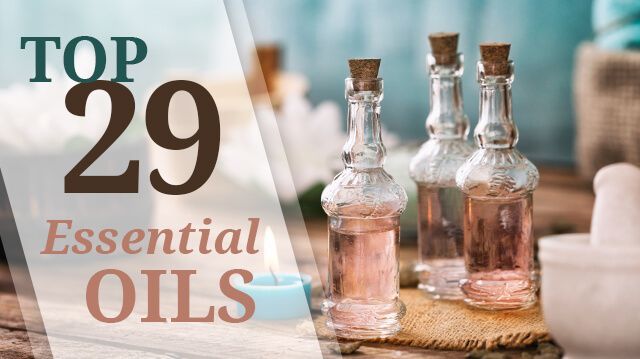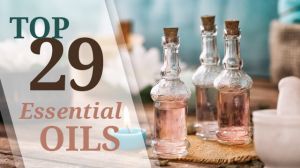
Essential oils have a wide array of uses. You can clean with them, cook with them, inhale them, drink them, apply them to your skin, or add a few drops to items in your home. The uses of essential oils are not only vast, but also often overlap. The following is a list of the most versatile and popular essential oils:
Cinnamon: This exotic oil is used in cooking, cleaning and healing. Cinnamon oil can be used to boost both the circulatory and immune systems. It is antibacterial and is often used to improve oral health. Cinnamon oil used to be applied to brooms to kill bacteria while sweeping.
Lavender: Lavender is renowned for calming the body and mind. It can be added to soaps, shampoos, teas, baked goods, fabrics, and even directly to the skin. Lavender oil can improve your skin and relieve aching muscles.
Chamomile: Another calming oil is chamomile oil. Chamomile can be added to foods and drinks for relaxation, or it can be used in aromatherapy. It can improve skin health and can even boost your immune system. Chamomile can also leave a fresh scent if applied as a homemade perfume.
Ginger: Ginger is often used in cooking and in teas to add intense flavor, cleanse the palate and support digestion. Ginger is anti-inflammatory and antibacterial. It can help treat nausea and increase circulation.
Lemon: Lemon oil is often added to cleaning agents due to its antibacterial and antiviral properties. It also leaves a fresh, citrus scent whenever used. It can be added to sweet, savory or tart dishes and helps promote good digestion.
Clove: Clove oil has a strong aroma that is used in cooking. It’s great for improving cardiovascular health, oral health and the immune system.
Peppermint: Peppermint oil has many uses. It can be inhaled, consumed or applied to the skin to relieve pain. It’s good for digestion and clears the nasal passages. It can even be added to your garden or around your house to repel pests.
Valerian root: Valerian root has a potent odor, but is an effective sleep aid and calming agent. It is also good for soothing the stomach and reducing depression. It can prevent heart palpitations and lower blood pressure.
Orange: Orange oil can help to repair the skin and stimulate lymphatic drainage. It can also be used as a household cleaner.
Lemon balm: Melissa, also known as lemon balm, can boost immune function and improve digestion when consumed. It can also be used to relieve stress and bodily tension.
Tea Tree: Tea tree oil is an antifungal and antibacterial agent with a variety of uses. It can help to relieve athlete’s foot, nail fungus, warts, cold sores, eczema and dermatitis. It is even used for stimulating hair follicle growth.
Myrrh: Myrrh is renowned for its mention in the Bible; however, it has many common uses. It is antimicrobial, anti-inflammatory and antifungal. For oral health, myrrh is an antiseptic that can reduce phlegm and tighten gums. It is also good for the stomach and can help alleviate gas. It can promote sweating, help heal wounds, and tighten muscles.
Patchouli: Patchouli has a pleasant scent that can reduce depression, boost libido and reduce inflammation. It is also used to stop hemorrhaging, promote cell growth, eliminate body odor and release toxins.
Oregano: Oregano oil is a powerful cleansing agent. It is antiviral, antifungal, antibacterial, antioxidant, antiparasitic and anti-inflammatory. It is used to fight infections, soothe inflammation, heal damage from oxidation, alleviate allergies and promote digestion.
Sage: Like oregano oil, sage contains the same cleansing properties. It can be used as a disinfectant, digestive agent, laxative and antiseptic. It can fight infections, relieve coughs and colds, reduce fever, and clear the bowels.
Ylang ylang: Ylang ylang is a great antidepressant, aphrodisiac, antiseptic and healing agent. It is used as an aid in various sexual disorders. It also helps reduce nervous disorders, lower blood pressure, and calm inflammation.
Rosemary: Rosemary oil is antiseptic, anti-inflammatory, antibacterial and a disinfectant. It can help ease pain and depression, ease digestion, help with respiratory problems and stimulate hair growth.
Ravensara: Ravensara oil can help relieve allergy symptoms, fight infections and remove toxins. It inhibits bacterial, viral, microbial and fungal growth.
Thyme: Thyme oil can relieve gas, regulate periods and increase urination. It is also an effective insecticide, antibacterial agent and antiseptic. It’s good for chest infections, respiratory problems, colds and heart problems.
Spearmint: Spearmint oil may resemble peppermint oil, but its uses are slightly different. Like peppermint oil, it is an antiseptic oral agent, bug killer, and digestive agent. However, it is also good for the brain and supports emotional health. In addition, spearmint can relieve muscle spasms and support muscular health.
Sandalwood: Sandalwood is an aromatic tonic and sedative that can boost memory and reduce inflammation. It’s good for the skin, digestion, and even hair loss.
Lemongrass: Lemongrass is a tasty and aromatic oil that is also antiseptic, antidepressant, antifungal, antibacterial and anti-inflammatory. It can alleviate pain and depression, reduce gas and fevers, strengthen gums and hair follicles, and can even be used to kill body odor as a natural deodorant.
 Cassia: Cassia is an effective antiviral and antimicrobial agent. It reduces hemorrhaging, fights infections, reduces gas, reduces arthritic pain and rheumatism, lifts mood and fights depression, inhibits vomiting, improves circulation and prevents diarrhea.
Cassia: Cassia is an effective antiviral and antimicrobial agent. It reduces hemorrhaging, fights infections, reduces gas, reduces arthritic pain and rheumatism, lifts mood and fights depression, inhibits vomiting, improves circulation and prevents diarrhea.
Eucalyptus: Eucalyptus oil has gained popularity as a respiratory aid, but it can also improve the texture of the skin, reduce inflammation, fight fungal infections, heal wounds, reduce muscular pain, and kill body odor as a natural deodorant. It is great for dental care, and can soothe chronic coughing and a sore throat. It’s even good for diabetes, fever, mental exhaustion and intestinal germs.
Frankincense: Another biblical essential oil, frankincense is used for a variety of health needs. It has antiseptic, digestive, diuretic, astringent, expectorant and sedative properties. It is also a good household disinfectant.
Fennel: Fennel oil is both strong and potent. Fennel oil works as an antiseptic, diuretic, laxative and tonic. It protects wounds, prevents infection, purifies blood, reduces gas, regulates the menstrual cycle, clears the bowels, and increases appetite.
Juniper berry: Juniper essential oil is a powerful antiseptic. It can be used topically to heal wounds and protect wounds from infection. It can be ingested to promote urination, release gas, and soothe the stomach. It also promotes gum health, eases arthritic pain, and purifies the blood.
Birch: Birch can clean both the inside of your house and the inside of your body. It reduces pain, clears the bladder, protects from infection, reduces fever, purifies the blood, clears the mind, and kills germs.
Jasmine: Jasmine oil has a sweet, floral scent that can ease depression, improve your mood, boost libido, regulate the menstrual cycle, and relieve phlegm and coughing. It can be used topically to protect against infection and heal wounds and scars. It can also be used to reduce pain, including labor pain and pain caused by inflammation.
With so many essential oils on the market, there’s something for everyone. What are some of your favorites? What have you found to be most effective for health and household use? Leave us your comments below.
—Nicole Manuel
Nicole Manuel, CPC is a certified life coach with a degree in economics and over five years of professional writing experience. Her goal is to help others discover ways to incorporate sustainable solutions that can improve their health and well-being on a budget.
Sources:
http://articles.mercola.com/herbal-oils.aspx
http://www.sustainablebabysteps.com/uses-for-essential-oils.html
https://www.organicfacts.net/health-benefits/essential-oils/list-of-essential-oils.html
http://www.takingcharge.csh.umn.edu/explore-healing-practices/aromatherapy/how-do-i-choose-and-use-essential-oils
http://www.huffingtonpost.ca/2014/07/02/benefits-of-essential-oils_n_5536808.html
http://www.naha.org/explore-aromatherapy/about-aromatherapy/most-commonly-used-essential-oils/
http://www.theecologist.org/green_green_living/health_and_beauty/786191/top_10essential_oils.html
http://www.lifehack.org/articles/lifestyle/10-essential-oils-always-have-home.html
https://www.organicfacts.net/health-benefits/essential-oils/valerian-essential-oil.html

